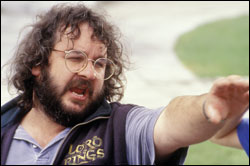You can argue forever—and some people tediously will—over what’s included and what’s missing from the whole LOTR cycle and whether this or that character should have been portrayed in this or that way. Did they really need to cut out Saruman’s last stand at Isengard or Faramir and Eowyn’s hair-twining meeting to make room for more battling trolls? And what’s Liv Tyler doing as an elf princess? But these are deliberate and at least arguable choices, the kind that get made when books get adapted. The worst failing of the Oscar-nominated script that Peter Jackson co-wrote with Fran Walsh and Philippa Boyens stems from neglect, not intent—from the sort of tone deafness that goes all too often with lavish spectacle, and which no CGI magic can correct.
J.R.R. Tolkien may not have been one of the great English prose stylists, and he was much worse as a poet. But he maintained a tone—usually grave, occasionally comic—that let his great tale get told, avoiding the twin shoals of arch pseudo-medievalisms and incongruous contemporary colloquialisms. Jackson and his collaborators do fine as long as they use Tolkien’s words. But when they insert their own, they crash on the second shoal, interjecting filler as banal as anything improvised in a classroom skit. When faced with danger, Gimli, Legolas, or another hero announces the obvious—”The orcs are coming! Look out for the orcs!”—just in case we’ve missed those armies streaming over the horizon. Even when they have something important to say, they say it in casual American English phrasings that would be clumsy in a sitcom and jar starkly in the meta-medieval milieu of Middle-earth. “I’m going to save you,” Eowyn tells dying King Theoden. “I have to let you go,” he replies. (You wait for him to add, “It’s time for us to find closure.”) When Aragorn awes a ghostly host by brandishing the Sword That Was Broken, he doesn’t say that it’s been forged again. He announces, “It is remade!” Remade. Now there’s a vivid verb for a peak moment.
Yes, these are trivial points, but they puncture the suspension of disbelief that is the heart of fantasy. Again and again, epic stagings and splendid effects are undercut by throwaway writing; the money is all on the screen, not in the words. Such tin-eared, anachronistic phrasing is an especially cruel trick to play on a philologist who claimed he started out imagining the languages of his Middle-earth, then imagined characters to speak them and stories and lands for those to inhabit.
If they do win an Academy Award this Sunday for their writing, I wonder how Jackson and company will acknowledge the author they adapted. Maybe something like, “Thanks to that Tolkien dude for all his great words. And stuff.”








